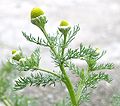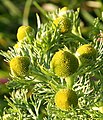Difference between revisions of "Matricaria discoidea"
m (1 revision: From PNW foraging book - part 3) |
|
(No difference)
| |
Latest revision as of 22:08, 13 August 2018
| Matricaria discoidea | |
|---|---|

| |
| Pineappleweed | |
| Scientific classification | |
| Kingdom: | Plantae |
| Clade: | Angiosperms |
| Clade: | Eudicots |
| Clade: | Asterids |
| Order: | Asterales |
| Family: | Asteraceae |
| Genus: | Matricaria |
| Species: | M. discoidea
|
| Binomial name | |
| Matricaria discoidea | |
| Synonyms | |
|
Artemisia matricarioides auct. | |
Matricaria discoidea, commonly known as pineappleweed,[3] wild chamomile, and disc mayweed is an annual plant native to Northeast Asia where it grows as a common herb of fields, gardens and roadsides.[4] It is in the family Asteraceae. The flowers exude a chamomile/pineapple aroma when crushed. They are edible and have been used in salads (although they may become bitter by the time the plant blooms) and to make herbal tea. Pineapple weed has been used for medicinal purposes, including for relief of gastrointestinal upset, infected sores, fevers, and postpartum anemia.
Description
The flower head is cone-shaped, composed of dense-packed yellowish-green corollas, and lacking ray-florets. The leaves are pinnately dissected and sweet-scented when crushed. The plant grows 2 to 16 inches (5.1 to 40.6 cm) high. Flowerheads are produced from March to September.
Distribution
The plant grows well in disturbed areas, especially those with poor, compacted soil. It can be seen blooming on footpaths, roadsides, and similar places in spring and early summer. In North America, it can be found from central Alaska down to California and all the way to Nova Scotia and Newfoundland. It has also become common and naturalised in Britain.[5]
- Native
-
- Palearctic
- Russian Far East: Amur Oblast, Kamchatka Peninsula, Khabarovsk Krai, Kuril Islands, Magadan Oblast, Primorsky Krai, Sakhalin
- Eastern Asia: Hokkaido
- Middle East: South of Iran[citation needed]
Gallery
References
- ↑ "Matricaria discoidea". Natural Resources Conservation Service PLANTS Database. USDA. Retrieved 2008-06-14.
- ↑ Germplasm Resources Information Network (GRIN) (2005-09-07). "Taxon: Matricaria discoidea DC". Taxonomy for Plants. USDA, ARS, National Genetic Resources Program, National Germplasm Resources Laboratory, Beltsville, Maryland. Archived from the original on 2008-04-22. Retrieved 2008-06-14.
- ↑ "BSBI List 2007". Botanical Society of Britain and Ireland. Archived from the original (xls) on 2015-01-25. Retrieved 2014-10-17.
- ↑ "Pineapple Mayweed". NatureGate.
- ↑ The Wildlife Trusts, "Pineappleweed" http://www.wildlifetrusts.org/species/pineappleweed
External links
| Wikimedia Commons has media related to [[commons:Template:If then show|Template:If then show]]. |
- USDA Plants Profile for Matricaria discoidea (Disc mayweed, Pineapple weed)
- Jepson Manual treatment: for Chamomilla suaveolens —Matricaria discoidea
- University of Michigan Native American Ethnobotany — Matricaria discoidea
- Pineapple weed - Matricaria discoidea
- Robbins, W. W., Margaret K. Bellue, and Walter S. Ball. 1970. Weeds of California. Documents and Publications, Sacramento. 547 p.
- Gregory L. Tilford. 1997. Edible and Medicinal Plants of the West. Mountain Press Publishing Company, Missoula. 110 p.
- University of California-Davis, Statewide Integrated Pest Management Program — 'Pineapple weed'
- Den virtuella floran: Matricaria discoidea distribution
- Matricaria discoidea — U.C. CalPhotos Gallery
Lua error in Module:Taxonbar at line 144: attempt to index field 'wikibase' (a nil value).
- Pages with script errors
- Commons category link from Wikidata
- Commons category link is on Wikidata using P373
- Anthemideae
- Flora of Northeast Asia
- Flora of Japan
- Flora of Alaska
- Flora of Yukon
- Flora of Alberta
- Flora of British Columbia
- Flora of the Northwestern United States
- Flora of the Southwestern United States
- Flora of the Sierra Nevada (U.S.)
- Flora of California
- Flora of Baja California
- Taxa named by Augustin Pyramus de Candolle








